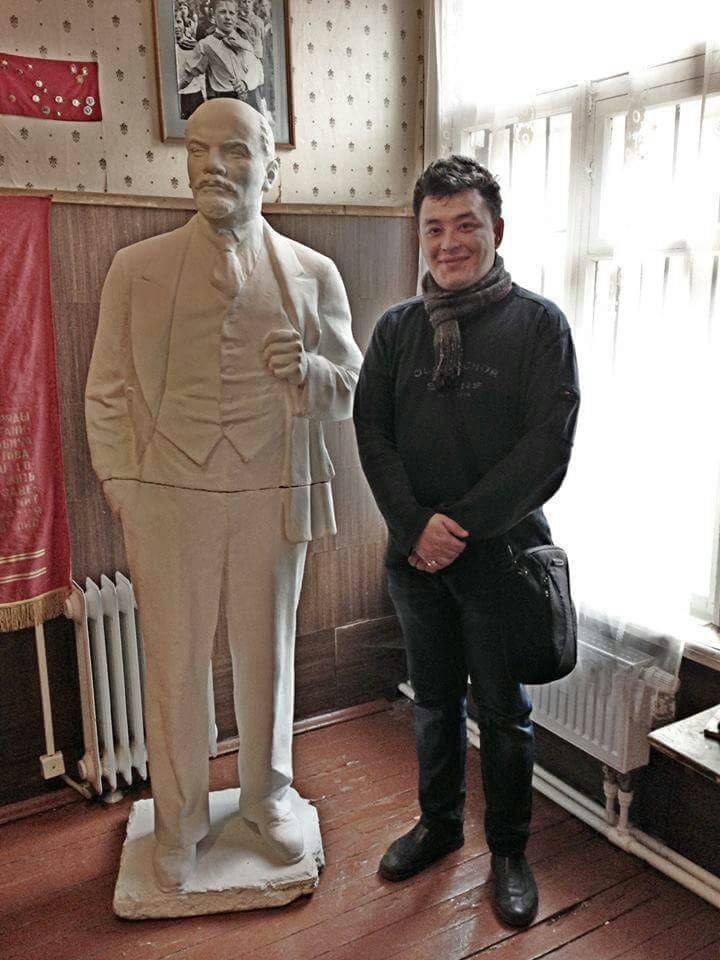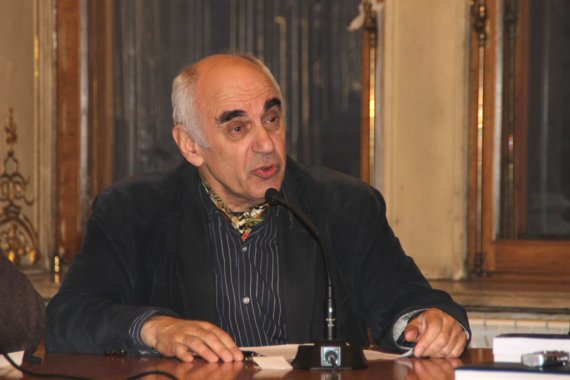
Maria Tyurikova • Facebook • December 31, 2021
URGENT MESSAGE FOR MEDIA AND HUMAN RIGHTS ADVOCATES!
SHARE AND PROMOTE!
Stop deportation of Danila Vasilyev!
PREAMBLE
As a politically active young man, Mr. Vasilyev took part in various movements that took place around the presidential election in Russia in 2018.
He is also a founder of an athletics club which provided the local youth with an opportunity to exercise, take part in competitions and tournaments, as well as to participate in cultural events and activities. The athletic society was also involved in regional politics and a number of its members were political activists. Mr. Vasilyev also participated in the work of a YouTube channel that satirised current Russian political events and Russian politicians.

As an act of civil disobedience and due to their disagreement with Russian foreign and internal policy (mainly due to the Russian aggression in Ukraine and the Russian carpet bombings of civilian population in Syria), on 11.11.2018 Mr. Vasilyev and two of his friends (A. Shabarchin and A. Etkin) organised a political performance at one of Perm’s squares. The performance consisted of a mannequin with a mask of Vladimir Putin, that was tied to a pole. The placard on the mannequin’s chest read «Военный Преступник Пыня В.В.» [Translation: “War Criminal V.V. Pynya”; this is a derogatory nickname fior Vladimir Putin.] This political performance was recorded and later published on YouTube and various social media.
On 03.01.2019 Mr. Vasilyev and his friends were detained and their homes searched. They were charged with «Hooliganism committed by an organised group in a preliminary conspiracy» (Article 213, Part 2 of the Russian Penal Code). The investigation was conducted among others by the Russian Centre for Prevention of Extremism (known as Centre E), which in reality is one of the main tools of oppression and are frequently used to suppress and terrorise the opposition. The case and the course proceedings were covered by a variety of Russian and international media, while a number of organisations and individuals called the case a political one. On 18.08.2020 A. Shabarchin and D. Vasilyev were found guilty.
Mr. Vasilyev’s sentence ended on 18.09.2021.
THE GETAWAY
Due to persecution Mr. Vasilyev decided to leave Russia and seek political asylum in Europe. Once his probation term ended, he applied for and subsequently received a Hungarian tourist visa and on 14.10.2021 arrived in Budapest. His intention was to seek political asylum in Hungary in accordance with the Dublin Regulation. Upon arrival he reported to a Hungarian police officer at the Budapest Airport, who directed him to an immigration centre where he was informed that Hungary does not accept refugees, asylum seekers and does not grant political asylum. He was instructed to travel to Austria.
He was never able to apply for political asylum in Hungary, no formalised procedure took place (including verbal application), he was not at any point taken into custody and the Hungarian authorities refused to provide any written acknowledgement of his presence there.
He spent the night in a hostel in Budapest and the following day of 15.10.2021 took a train to Vienna.
Upon his arrival at Vienna Central Station on 15.10.2021 (Friday) evening, Mr. Vasilyev entered a local police station where he stated that he seeks political asylum due to persecution in his homeland. Once again he was unable to apply for asylum. He was given a piece of paper with the address of the nearest immigration centre and was told to report there on Monday. As his Schengen tourist visa was still valid for several days, Mr Vasilyev was able to leave the police station and for the next two days was hosted at a private residence of compassionate Austrian nationals.
The day of his arrival in Austria, the Russian authorities arrested a number of his friends and colleagues from the Perm athletic club. Mr Vasilyev’s flat was stormed by the Russian police and his whereabouts were investigated by both police and Russian security services.
On 18.10.2021 he reported to the Refugee Centre at Traiskirchen in Lower Austria, as it was established that he was under no legal obligation to report to the Viennese centre that he was referred to. There, Mr. Vasilyev once again attempted to seek political asylum, however, he was told to report to the Refugee Centre located near the Vienna International Airport Schwechat where he was finally able to apply for political asylum and begin the asylum seeking process as defined by the laws of the Austrian Republic. Following the required first interview he was transferred to the Traiskirchen Refugee Centre.
On 23.10.2021 Mr Vasilyev was transferred to a Refugee Centre in Ohlsdorf, Upper Austria, on the outskirts of Gmunden.
AWAITING DEPORTATION FROM AUSTRIA
On 27.12.2021 Mr Vasilyev received a letter from the Austrian authorities that suggests his eminent deportation to Hungary, in accordance with the Dublin Regulation. On the 29.12.2021 he was able to discuss the document in question with an advisor provided by the Bundesamt für Fremdenwesen und Asyl who failed to clarify the nature of the letter and was unable to communicate with Mr. Vasilyev in a language that he could understand. On 30.12.2021 Mr Vasilyev contacted the responsible agency (Bundesamt für Fremdenwesen und Asyl) with the desire to clarify the content of the letter and in order to preemptively appeal the possibility of deportation.

The Hungarian authorities instructed Mr. Vasilyev to travel to Austria in order to seek political asylum. The current Hungarian government led by Victor Orban is on good terms with the current Russian regime and will undoubtedly repatriate a Russian national who seeks political asylum. The practices of the Hungarian government in regards to refugees and asylum seekers have been criticised by both the UNHR (United Nations High Commissioner for Refugees) and the ECHR (European Court of Human Rights).
It is very likely that the Russian Federation will demand Mr Vasilyev’s extradition based on falsified criminal charges. In the event of his return to the Russian Federation, Mr Vasilyev will be arrested and tried on either false criminal charges or charged with one of the offences that the Russian prosecution service is currently attempting to pin on his friends and his colleagues from the Perm athletic club. A number of them were arrested in October 2021 and several are awaiting trial. In recent years, the regime of Vladimir Putin frequently tries political activists and opposition figures on fabricated criminal charges.
If Danila Vasilyev is returned to Russia and imprisoned, it is possible that he will not survive prison. Those who oppose the Russian government are frequently murdered while incarcerated, tortured by the prison authorities and denied medical assistance. The most prominent case is that of Sergei Magnitsky, a tax advisor who uncovered large-scale corruption and died in prison due to denial of medical assistance. His death resulted in international outrage and a number of sanction lists against Russian officials, enacted by the European Union and the United States.
!!! WE URGE ALL MEDIA, HUMAN RIGHTS ADVOCATES, DECISION MAKERS, and all [concerned] people to stand up for Danila and PREVENT THE EXECUTION OF THE OFFICIAL DECISION TO DEPORT HIM TO HUNGARY and further to the Russian Federation !!!
(Credits to Democratic Movement for Freedom in Russia – Vienna, Austria , Michael Alexander Albert Korobkov-Voeikov for the text)
I have edited this message slightly to make it more readable. ||| TRR
Russian Jets Knock Out Water Supply In Syria’s Idlib • RFE/RL • January 2, 2022
Russian warplanes have bombed a pumping station that provides water to rebel-controlled Idlib city in northwestern Syria, potentially depriving hundreds of thousands of people in the overcrowded city of water, according to witnesses and a monitoring group.
Russian Sukhoi jets dropped bombs in Idlib and several surrounding villages on January 2, witnesses and the U.K.-based Syrian Observatory for Human Rights monitor said.
“Reliable sources said that Russian fighter jets have so far carried out nearly 10 air strikes targeting the vicinity of Al-Sheikh Yusuf village in western Idlib countryside, the vicinity of the central prison near Idlib city, and the vicinity of Sejer water station, which feeds Idlib city and its western villages, leaving the station out of action as pipes have been damaged,” the Syrian Observatory for Human Rights said.
An official at the city’s water utility service confirmed the pumping station was out of action as a result of the strikes.
There was no immediate comment from the Russian or the Syrian armies.
More than 3 million civilians live in jihadist and rebel-controlled Idlib Province, many of them displaced from other parts of Syria during the country’s decade-long civil war. Most of the population in Idlib is dependent on UN humanitarian assistance to survive.
In March 2020, Russia, which backs Syrian President Bashar al-Assad’s forces, and Turkey, which supports some opposition groups, agreed to a de-escalation zone in Idlib. However, rebel attacks and Russian and Syrian bombing have continued despite the cease-fire.
Turkey has thousands of troops deployed at bases in Idlib to deter a Syrian Army offensive, which it fears would push millions of people across the border as refugees.
Syrian and Russian planes have carried out deadly aerial strikes on schools, hospitals, markets, and other infrastructure in Idlib Province that UN investigators and rights groups say may amount to war crimes.
Jihadist factions have also been accused of carrying out possible war crimes.



 Exhibition view of Vasya Lozhkin, Russia, Great and Beautiful (2010). Photo courtesy of
Exhibition view of Vasya Lozhkin, Russia, Great and Beautiful (2010). Photo courtesy of  Detail of Vasya Lozhkin’s Russia, Great and Beautiful. Russia is shown as surrounded by countries inhabited by “slant-eyed monkeys,” “wogs,” and other peoples identified by equally offensive terms for non-Russian peoples and ethnic groups. Image courtesy of
Detail of Vasya Lozhkin’s Russia, Great and Beautiful. Russia is shown as surrounded by countries inhabited by “slant-eyed monkeys,” “wogs,” and other peoples identified by equally offensive terms for non-Russian peoples and ethnic groups. Image courtesy of  Kristina Snopp and her husband, Denis. Photo courtesy of Ms. Snopp and OVD Info
Kristina Snopp and her husband, Denis. Photo courtesy of Ms. Snopp and OVD Info
 The photograph that supposedly led to Kristina Snopp’s dismissal from her job. Courtesy of Ms. Snopp and OVD Info
The photograph that supposedly led to Kristina Snopp’s dismissal from her job. Courtesy of Ms. Snopp and OVD Info A photo of Kristina Snopp’s punk rock group Guerillas Gone Mental. Courtesy of the band’s
A photo of Kristina Snopp’s punk rock group Guerillas Gone Mental. Courtesy of the band’s 
 A photo of Kristina Snopp holding what looks to be a skull. According to a police forensic examination, the skull was real. Photo courtesy of Ms. Snopp and OVD Info
A photo of Kristina Snopp holding what looks to be a skull. According to a police forensic examination, the skull was real. Photo courtesy of Ms. Snopp and OVD Info  In Finland
In Finland Screen shot of the message posted about Viktor Filinkov’s arrest on the Telegram channel of the Joint Press Service of the St. Petersburg Courts, January 25, 2018
Screen shot of the message posted about Viktor Filinkov’s arrest on the Telegram channel of the Joint Press Service of the St. Petersburg Courts, January 25, 2018 Evgeny Shtorn. Photo from his personal archives
Evgeny Shtorn. Photo from his personal archives
 Dmitry Buchenkov
Dmitry Buchenkov